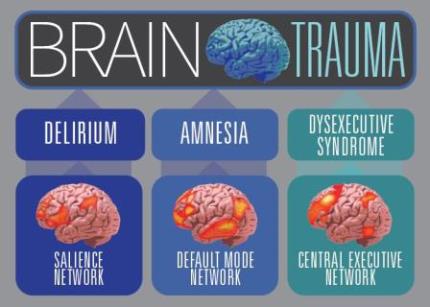Scientists issue a call to action for TBI patients to benefit from latest neuroscience findings
.
Brain-injured patients need therapies based on cognitive neuroscience (U. Illinois press release):
“Patients with traumatic brain injuries are not benefiting from recent advances in cognitive neuroscience research — and they should be, scientists report in a special issue of Current Opinion in Behavioral Sciences.
Those who treat brain-injured patients rarely make use of new scientific discoveries about the workings of the brain. Instead, doctors, nurses and emergency personnel rely on a decades-old tool, the Glasgow coma scale, to categorize brain injuries as mild, moderate or severe.
(Instead) He and his colleagues propose that doctors take a deeper look at the brain networks that enable the regulation and control of attention, memory and thought — termed “cognitive control processes” — and use this knowledge to develop more targeted treatment strategies.”
Paper: Network topology and dynamics in traumatic brain injury (Current Opinion in Behavioral Sciences)
- We propose a network approach to clinical translation that defines core behavioral phenotypes of traumatic brain injury (TBI) with respect to damage to specific intrinsic connectivity networks (ICNs). We survey recent approaches to clinical translation from cognitive neuroscience that enhance network function and recovery from brain injury through interventions that deliver targeted (network specific) and global (systemic) effects. A network approach provides insight into the mechanisms of brain injury, linking ICN characteristics to specific profiles of cognitive impairment, providing key neurobiological targets for therapeutic intervention, and motivating new perspectives about the nature of cognitive recovery and rehabilitation in TBI.



